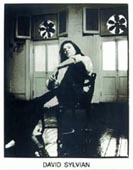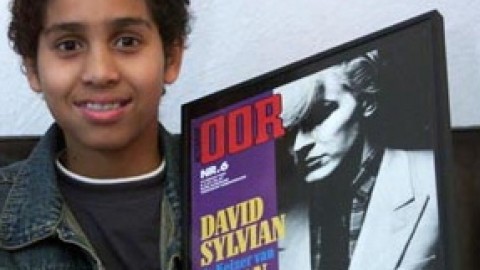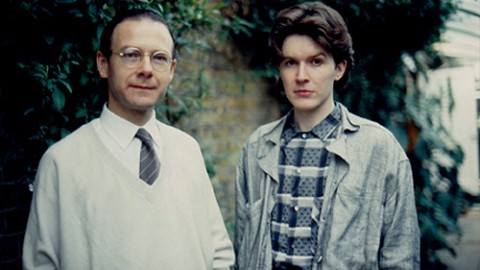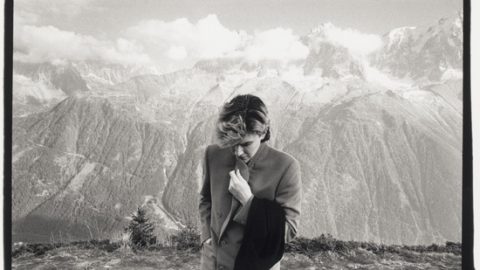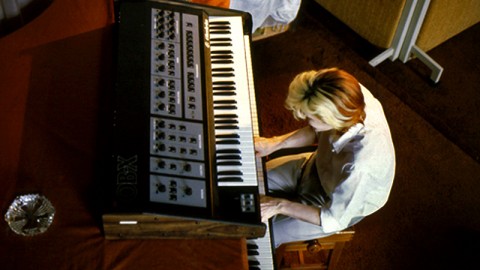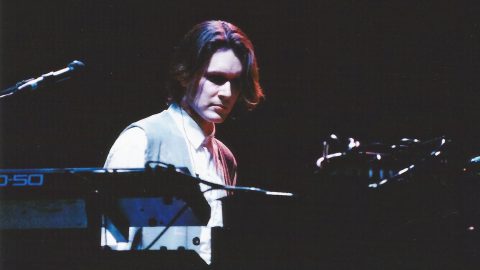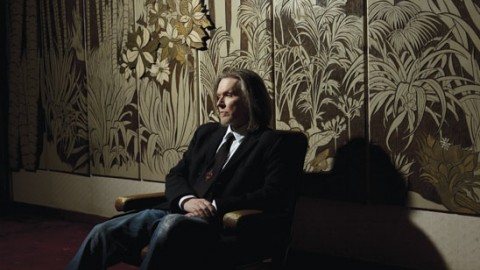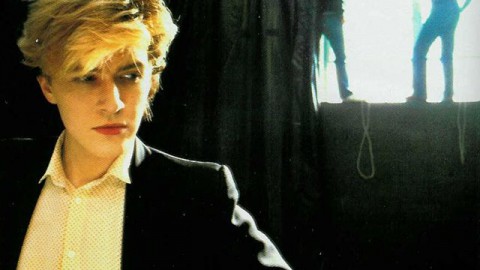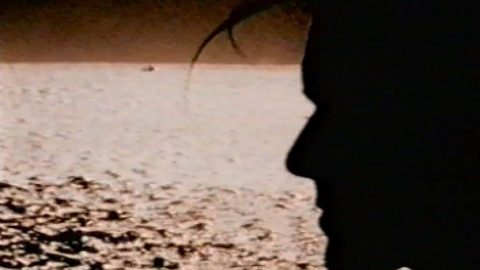The Importance of the Slash by Josef Woodard (Raygun Magazine September ’93)
One sings, low and moody, kind of a cryptic crooner. The other paints in bold guitar brushstrokes, sitting down on the job, and impeccably straight-postured, with expressionistic sweeps of sound and syncopated rhythms.
This is Sylvian / Fripp, being David and Robert, two of the more entrenched elite gentlemen of the English experimental world of music. Please note the slash: More than a tic of punctuation, it precisely defines the synergetic nature of the beast. “We toyed with band names,” Sylvian says, with his typical understatement, “but came back to Sylvian / Fripp. It’s straightforward,” he laughs.
When the pair converges on the offices of Virgin Records in Los Angeles to talk about their first official collaboration effort, The First Day, they are separated by a kind of architectural / spacial slash of sorts. They want to be interviewed separately, lest one would step on the other and breach protocol. There is the issue of disparate conversational styles: Sylvian is soft-spoken, retiring, economical; Fripp is always circling around big ideas in expansive, articulate terms. But opposites attract, and that is exactly the principle which allows this album to get under your skin so successfully.
Sylvian, beaded and clad in slightly flamboyant color schemes, is dwarfed by the endlessly long Virgin Records boardroom table, as he tries to get to the heart of the matter. “I find that the crux of my relationship with Robert has to do with what we believe to be the role of music and the function of the musician. As characters, we’re very different, as our methods of working were very different. But we try to remain flexible. For example, in the studio, Robert is the kind of musician who would like to put something down on tape in the first take, if possible–second take, maybe–whereas I’m more meticulous. I tend to work far more slowly and look at all my possibilities and sift through them, and then pick through these. We had to find a way of working together in the studio that would be compatible. I think what we ended up with was music that did have the finer details, but at the same time, had these performances that! were very inspired and off-the-cuff. They were there-and-then.”
There it is: This is rock music both hard and soft, tightly focused and yet free to roam. A happy medium between many modes of popular and alternative music, it’s like nothing you’re likely to hear on a given day at the radio races.
The seeds of the current union go back to Sylvian’s Gone To Earth album of 1986, which featured Fripp as one of the guests. When Sylvian was offered a Japanese tour in early 1992, he thought it would be a fine time to get involved with Fripp and asked if he would want to team up, to seize the opportunity. Setting a daunting course for themselves, the pair–accompanied by stick player Trey Gunn–worked up sketches for material in a short space of time.
As Sylvian explains, “I mentioned the tour to Robert because I didn’t have any intentions of doing it. But he said, ‘Well, let’s use that as an impetus to write.’ So we got together two weeks prior to the actual event, which gave us a week to write the material and a week to rehearse it. That kept us on our toes.”
Why the cruel, self-imposed deadline?
“Robert likes to be put under a certain amount of pressure because he believes it helps to focus you. You have to be there. You have to present. It was the most enjoyable live experience I’ve had,” says Sylvian, never an avid road warrior. His only solo concert tour was in 1988.
“Because the work was flexible, something new was happening every night,” he continues. “I also felt that the intensity of Robert’s focus was a lesson to me in live performance. I can be distracted by many things in live performance. In the studio, I’m far more obsessive, but live performance has always been a problem for me. With Robert, he was totally there, from the moment he went on stage. This gave an intensity to the performance in general.”
Next in this music’s evolution came a tour of Italy, as Fripp says, grinning, “because the food in Italy is always good. The business is always a problem and the food is always good.” Then came the recording, which took place in Woodstock and at Daniel Lanois’ legendary King’s Way studio in New Orleans.
On an internal level, what The First Day represents for both of the principal parties is a kind of dual reentry program. For Fripp, the album clearly announces his return to what he likes to call “life as a working musician” after seven years spent conducting his Guitar Craft seminars. Then came a year of disentangling himself from an unsavory business relationship with his long-standing management company. The legal wrestling match with E.G. Management continues.
“I was very fortunate that music, in the form of David Sylvian and I, came together and took me out of this totally utterly wretched period of death and blackness and brought back a little light. And the light has been growing.”
The obstacles were less litigational and more liturgical with Sylvian. “The past four or five years have been pretty intense for me, and I’ve been going through a very negative period in my life, which came as a big surprise to me. I was falling into a kind of spiritual and mental crisis. When I was in the midst of it, I didn’t feel equipped to be able to write about it. In fact, writing was the last thing I wanted to do. It just wasn’t something I was prepared for.
“So I forced myself to do collaborative work, so that I would be forced on the spot to come up with material. I was hoping that be looking at the material, I would be able to see what was happening to me. This has happened in the past on many occasions. It was this project that offered me that possibility, because I wanted to get involved in something that was more intense musically, more aggressive and confrontational. That was necessary for the kinds of things I wanted to express.”
Whereas some of Sylvian’s earlier albums tend to lean towards the ethereal and the atmospheric, the sonic blitz of much of The First Day arrives in your face and seizes your clavicle. Which was just fine by the once-dreamy Sylvian. “I certainly felt that I wanted to make an album that was far more dynamic than the kind of work I had been involved in, a little more aggressive, because of the lyrical content I wanted to tackle.”
One of the nicely strange, ear-bending aspects of the album is the way Sylvian’s voice is tucked and folded onto the overall textural onslaught, rather than riding on top of the band in the way of standard pop music. Sylvian says, “I felt very comfortable with this collaboration because there is that equal footing. We all carry the weight of the project. One isn’t leading the others.”
While Sylvian’s lyrics adroitly resist specific interpretations, the general thematic terrain is “dealing with the frustration of urban life as it is now and the values that are forced upon us. It’s about struggling with that, the survivalist mentality–how to just get by and get on. A lot of the lyrics are dealing with that, sometimes humorously, sometimes more intensely. Increasingly, as the album progresses, there becomes more hope. There’s a way out. In the song ‘Darshan‘, we’re talking about spiritual initiation. ‘Bringing Down The Light‘ speaks for itself. There’s a journey being made, that’s about relevation in a way.”
A gust of irony blows into the album on the song ‘Darshan’. Amidst the extended post-dance delirium, Sylvian sings the dark-funny phrase, “kneeling on the road to Graceland”. “It’s an ironic line, but it’s also a very sincere line, and that’s why I like it. The notion of Darshan implies a kneeling, a bowing before some power greater than one’s self. At the same time, it’s a rock album. So it was a funny line.”
The album’s canvas ranges from Fripp’s high tech gadgetry to Sylvian’s grisly distorted vocals on ‘Firepower‘, a sound achieved when engineer / co-producer David Bottrill fed his voice through a cheap Radio Shack amplifier. “That little box came in handy,” Sylvian notes, “far more than some of the more expensive equipment that Robert and I invested in.”
Experimental energies and odd musical hybrids notwithstanding, The First Day is a pop album, at least in the broad definition of the term. “I like the medium of pop,” Sylvian asserts. “It’s a great way to communicate, and surely that’s what every musician is trying to do. As long as there is no compromise made, it’s great. I like the confines that pop music tends to throw up. I like working within very simple structures, like verse-chorus-bridge. If you’re working with very defined structures like that, you can afford to take away some of the supports, some of the signposts that say, ‘Here’s the chorus.’ Everybody knows that, so you can be more subversive with the arrangements. You can take away a lot of things, and it’s still accessible.”

